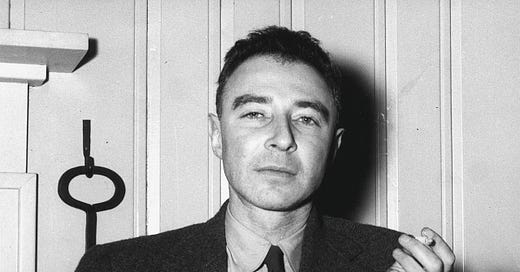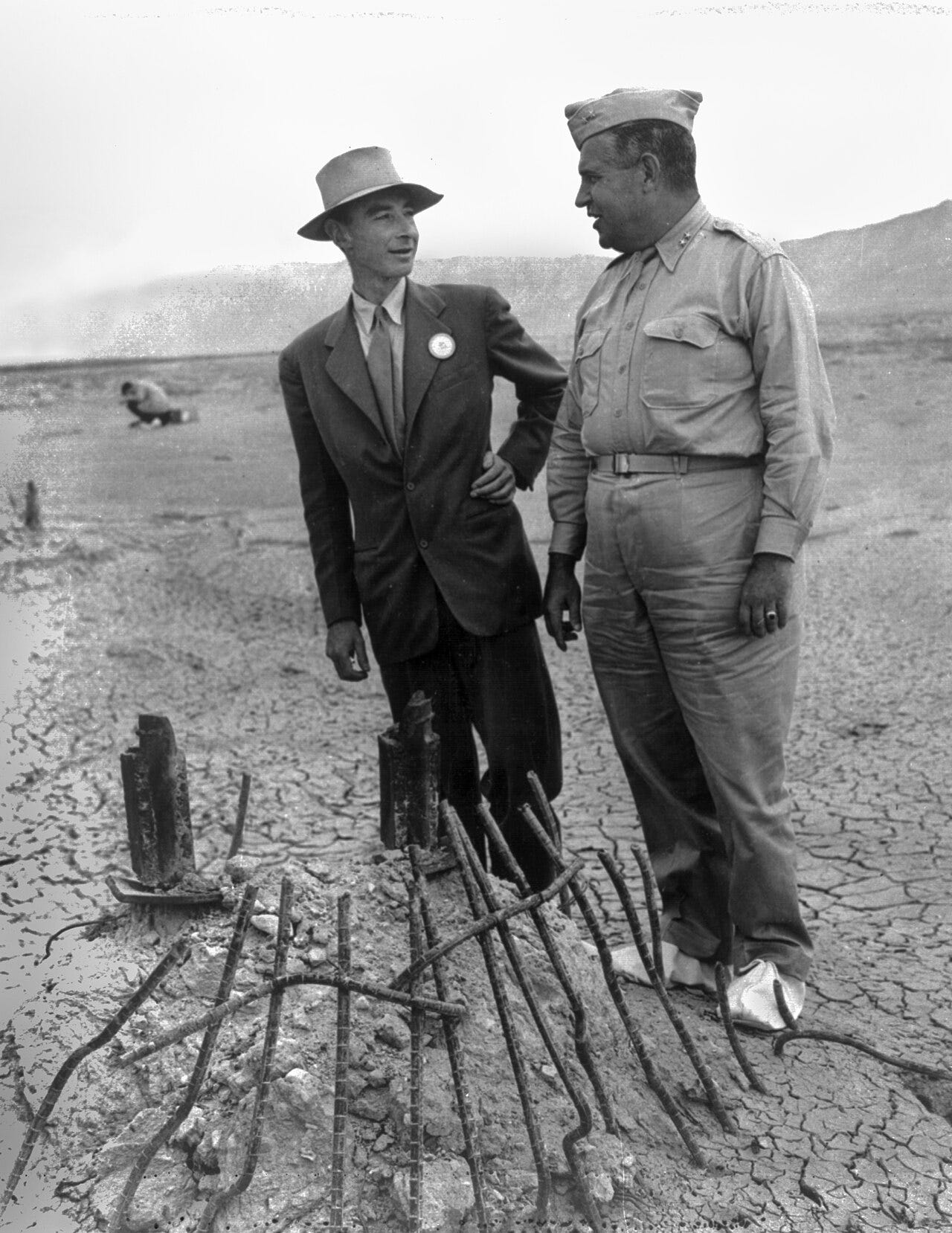The September edition of Commentary magazine has a movie review entitled “Oppenheimer was a Communist” by the venerable Cold Warriors Harvey Klehr and John Earl Haynes. https://www.commentary.org/articles/harvey-klehr/oppenheimer-was-a-communist/ .
I have yet to see Christopher Nolan's newest movie, being on the remote southern Oregon coast for the summer. But the Klehr/Haynes review of it is so disingenuous about the counterintelligence facts related to J. Robert Oppenheimer that I am compelled to write a straightforward clarification.
The review dedicates the first 22 of its 24 paragraphs to politely trashing Oppenheimer’s character and reviewing his association with Communist causes in the 1930’s and early 1940’s. These paragraphs raise concerns that, as a Communist, maybe Oppenheimer did leak atomic and nuclear secrets to the Soviets. Maybe the 1954 Atomic Energy Commission decision to revoke Oppenheimer’s security clearance was right and Energy Secretary Jennifer Granholm’s 2022 decision to vacate the AEC ruling was wrong.
Paragraphs 23-24, however, admit that “Knowing what we know now” the concerns about Oppenheimer being a Soviet spy were not true. Klehr and Haynes reluctantly write that, “Unquestionably, the hearing that denied the renewal of his security clearance was stacked against him.” And, “America’s public interest would have been best served if Oppenheimer had been able to continue his role as consultant to the government on various atomic projects.” But don’t worry, it’s ok, “None of this detracts from the greatest achievement of Oppenheimer’s life and one of the great scientific and engineering achievements in human history.”
Well, which is it? Was he or was he not a spy? Was the AEC decision to revoke Oppenheimer’s clearance a security matter or a political vendetta?
A Factual Counterintelligence Assessment
The Klehr/Haynes review never gets around to explaining “what we know now” so allow me to do so. I served as Director of Intelligence and Counterintelligence at the Department of Energy during 2010-2012 and oversaw our nation’s nuclear weapons complex as DOE’s Acting Undersecretary for Nuclear Security in 2013-2014. I know these facts as well as anybody and they are all now publicly available. The following is my best effort to provide a concise counterintelligence assessment of the 1954 Oppenheimer security decision in light of what we have learned historically.
First, the AEC decision itself is full of insight. You can read it at https://avalon.law.yale.edu/20th_century/opp06.asp .
What a reading makes evident is the centrality in the decision of the “Chevalier Incident.” Haakon Chevalier, a friend of Oppenheimer, probed him in late 1942 or early 1943 to provide Soviet Intelligence with secret reporting on the Manhattan Project. Oppenheimer flatly refused to do so. He prevaricated in reporting this malicious intelligence approach to US security officials but ultimately did so. On this basis, General Leslie Groves approved the Top-Secret security clearance that Oppenheimer needed to become director of Los Alamos.
Years later, in early December 1953, Oppenheimer met with Chevalier in Paris. Even Henry Smyth, the AEC commissioner most sympathetic to Oppenheimer, said it was “unwise” to meet with someone who had tried to recruit him to spy for Soviet intelligence. AEC Chairman Lewis Strauss detested Oppenheimer and in late December seized the opportunity of the Chevalier meeting to suspend Oppenheimer’s security clearance. Oppenheimer was willing to let his clearance lapse but was unwilling to accept a formal revocation as he felt this would indicate that he had somehow been disloyal to the US. Oppenheimer’s security clearance was revoked on 29 June 1954, one day before it was set to expire.
Key Points
1) The FBI had compelling proof of Oppenheimer’s loyalty through 1949. From the VENONA intercepts of Soviet Intelligence communications, by 1949 the FBI understood what the Soviets knew about the Manhattan Project, when they knew it, and who told them. There was one Soviet source inside Los Alamos that could not be identified but it was not Oppenheimer. If he had been reporting to the Soviets, they would have had more comprehensive intelligence and they would have had it sooner. (Klehr and Haynes have written a good book about VENONA.)
2) Between 1950 and 1953, the FBI had suspicions about Oppenheimer’s continued loyalty but had no proof of disloyalty. The issue was not the “atomic” bomb but the “hydrogen” bomb. Oppenheimer was the leading opponent of development of the hydrogen bomb. Lewis Strauss, Edward Teller, and others were in favor. President Truman decided to proceed with the hydrogen bomb in January 1950 after the Soviets had detonated their first atomic bomb in August 1949. The US conducted its first, full scale test of the hydrogen bomb in November 1952.
3) Shortly after his advice on the hydrogen bomb was rejected by President Truman, Oppenheimer renewed contact with Chevalier. Chevalier emigrated to France in mid-1950 after losing his job at UC/Berkley. On the way to France, he stopped at Princeton where he was a guest at Oppenheimer’s home for several days. Per the above, they met again in December 1953 in Paris. The FBI suspected that Oppenheimer could have passed secret information to Chevalier related to the US hydrogen bomb program, but they had no proof. To my knowledge, no such proof exists even today.
4) Because they had no proof of espionage, the 1954 AEC security review was careful not to accuse Oppenheimer of disloyalty. Instead, it focused on his character and associations. The decision notes, “The Atomic Energy Act of 1946 lays upon the Commissioners the duty to reach a determination as to ‘the character, associations, and loyalty’ of the individuals engaged in the work of the Commission.” The decision concluded that, “Dr. Oppenheimer is not entitled to the continued confidence of the Government and of this Commission because of proof of fundamental defects in his character.” And, “his associations with persons known to him to be Communists have extended far beyond the tolerable limits of prudence and self-restraint which are to be expected of one holding the high positions that the Government has continuously entrusted to him since 1942.”
5) Although the security review remained silent on the direct question of loyalty, it did insinuate, “These associations have lasted too long to be justified as merely the intermittent and accidental revival of earlier friendships.” This sentence suggests that Oppenheimer had other, nefarious reasons for these associations but does not specify what those reasons were. It raises the specter of disloyalty without saying the word “spy” nor offering any evidence to support it.
Points to Consider
a) The AEC was fully justified in its concern about Oppenheimer’s association with Haakon Chevalier during 1950-1953. If faced with a similar situation today, I would recommend that the person’s security clearance be somehow eliminated.
b) It was a mistake that the AEC did not accept Oppenheimer’s suggestion to let his security clearance lapse. This mistake has resulted in 69 years of controversy which Soviet and subsequently Russian Intelligence have been delighted to encourage. If faced with a similar situation today, I would accept the voluntary termination of the person’s security clearance and move on.
c) The insinuation noted in #5 above should not have been included in the decision memorandum. That it was included in a document so scrupulously crafted calls into question the objectivity and fairness of the entire proceeding.
d) The FBI had compelling proof of Oppenheimer’s loyalty though 1949 and no proof of any disloyalty during 1950-1953. Oppenheimer is dead but his reputation is alive. In America, we are innocent until proven guilty.
Conclusion
Oppenheimer may or may not have been a Communist in the 1930’s and early 1940’s. From 1943 onward, he was not a Communist as even Klehr and Haynes accept.
The AEC had legitimate security concerns but its decision on Oppenheimer’s clearance was not simply a security matter. Had it been, the AEC would have just let the clearance expire as it was set to do on 30 June 1954.
The AEC security review was indeed “stacked against him.” It destroyed his ability to serve “American public interest” by continuing “his role as consultant to the government on various atomic projects.” It cast a pall over “the greatest achievement of Oppenheimer’s life.”
Bravo to General Leslie Groves for exercising his authority and granting Oppenheimer a Top-Secret clearance in 1943. Groves shrewdly judged Oppenheimer’s wartime character. Without Oppenheimer there was no bomb to end the war with Japan. Oppenheimer was haunted by the 100,000 Japanese killed at Hiroshima and Nagasaki, but he saved the lives of over 1 million other Japanese citizens and American soldiers.
Bravo to President Kennedy for bringing Oppenheimer in from the cold in 1963. Kennedy authorized the award of the Fermi Medal for outstanding scientific achievement after being briefed on the still Top-Secret VENONA intercepts.
Bravo to Energy Secretary Ernst Moniz for creating the prestigious Oppenheimer Fellows Program in 2016 as a living tribute to a “loyal American.”
And bravo to Energy Secretary Jennifer Granholm for using the public interest created by Mr. Nolan’s film to vacate the AEC revocation of Oppenheimer’s clearance one day before it was set to expire.
Now, all Americans, whatever they think of Oppenheimer’s character, can move on in good conscience knowing that he was a loyal American to the day he died.






Bravo to you Bruce for helping set the record straight! The movie was very good but the "hearing" scenes were a little too dramatic...and did not give the audience a full appreciation of the facts.
Another great article Bruce. I saw Oppenheimer over the weekend - a worth see movie which handles the AEC review in detail. Your clarity is very welcome in fully explaining the situation. The historical context is so complex as the twenties lead to the thirties and then into a world war of alliances of convenience.